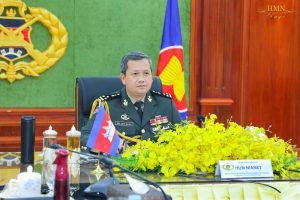Cambodia’s long-ruling Prime Minister Hun Sen yesterday endorsed his son Hun Manet to succeed him as the country’s leader, confirming the widespread belief that the 44-year-old is being groomed for the top job.
Hun Sen made the remark during a characteristically extempore speech in the coastal city of Sihanoukville, in which he declared his support for Manet to take over as the prime ministerial candidate of the Cambodian People’s Party (CPP).
“I declare today to support my son to be the next prime minister but it means nothing without an election. It must be voted on,” the 69-year-old said, according to a translation of his comments by the local media outlet Voice of Democracy.
Hun Sen went on to defend the idea of the family succession plan, drawing on the example of former Japanese Prime Minister Abe Shinzo, who came from a long line of politicians. “His grandfather was prime minister and he had visited Cambodia. Abe’s father was a foreign minister and Abe was a prime minister,” Hun Sen said.
Hun Sen has ruled Cambodia in various guises since 1985, and observers have long speculated on who might succeed him as prime minister. The majority of the speculation has settled on the West Point-educated Manet, 44, who has enjoyed a frictionless rise in the security apparatus and now serves in a number of important roles, including chief of the army, deputy commander-in-chief of the Royal Cambodian Armed Forces, deputy commander of his father’s personal bodyguard unit, and head of the country’s counterterrorism force. In a 2018 interview, Hun Sen referred to him as a “possible future leader” of Cambodia.
Despite talk of Hun Manet having to face the test of the ballot box, Hun Sen’s endorsement of his son is tantamount to an advance coronation. At elections in 2018, the CPP won all 125 seats in the National Assembly, after the banning in late 2017 of the popular Cambodia National Rescue Party (CNRP), the country’s only significant opposition party.
While Hun Sen may well allow a rump opposition party of some kind to grace the local elections in 2022 and national polls in 2023, the situation will be carefully crafted to ensure that the expected conclusion is placed beyond any reasonable doubt. If the CPP throws its weight behind Manet, then he is all but certain to be Cambodia’s next prime minister.
The announcement, which confirms what most observers of Cambodian politics have long believed about the likely line of succession, was followed by a flood of public endorsements from senior CPP officials and leaders of the security forces, which would seem to suggest a degree of buy-in from the CPP’s powerbrokers.
Manet’s ascension would continue the broad generational transition within the CPP, which has involved the (mostly) sons of first-generation CPP officials (born from the early 1930s to the mid-1950s) mainstreamed into key party posts and positions of increased responsibility within the sprawling government administration.
The transition from father to son seems unlikely to happen any time soon, however. In his speech yesterday, Hun Sen reiterated that he expected to be prime minister for another 10 years, which would take him beyond the 2028 election. The Cambodian leader also appeared to veto the prime ministerial ambitions of other older officials, including Interior Minister Sar Kheng, who has long been viewed as belonging to a rival faction of the CPP.
He said by 2028, Kheng would be 78 years of age. “If so, how does Kheng come to be a prime minister, for what?” Hun Sen said, according to Voice of Democracy. “I will continue to do it – won’t that be easier?”
Previously, some observers had speculated that Manet might be preceded by a placeholder roughly analogous to Singapore’s Prime Minister Goh Chok Tong, who served as prime minister between Lee Kuan Yew and his son Lee Hsien Loong. Hun Sen’s comments now appear to have ruled out such a transitional figure, though it is likely that he would, like Lee, continue to exercise a strong influence in a potential Hun Manet administration.
Another notable thing about the announcement was its timing, which came after an unusually busy week in Cambodian politics. On November 28, former prime minister Prince Norodom Ranariddh died in France at the age of 77. A rival then reluctant ally of Hun Sen, Ranariddh served as first prime minister in the ill-fated coalition government produced by the United Nations-backed election of 1993. While Ranariddh had long ceased to be a politically relevant figure in Cambodia, despite a comeback attempt prior to the 2018 election, his passage was symbolic, removing yet another of Hun Sen’s rivals from the scene.
The same day also saw the apparent collapse of the alliance between opposition leaders Kem Sokha and Sam Rainsy, after the former dissociated himself from Rainsy and accused him of using Sokha’s name to advance his personal political interests. The break, which prompted an outbreak of open acrimony between the two leaders and their supporters, marked the culmination of a long campaign by Hun Sen and his party to split the two opposition figures, who joined to form the CNRP in 2012 and scored significant gains at the 2013 election.
Given the significance of the past week’s events, it would be surprising if they didn’t play into Hun Sen’s decision to throw his weight behind Manet’s political prospects. But a lot of unknowns remain. Hun Sen will still likely face considerable challenges in bringing the ruling party together behind the succession plan. Meanwhile, his strategic attention will be strained by his perpetual war with his domestic political opponents and the growing competition between his main ally China and the United States.
Nonetheless, it is evident that the CPP’s nebulous leadership succession plan – the subject of long speculation – is finally beginning to take shape.

































